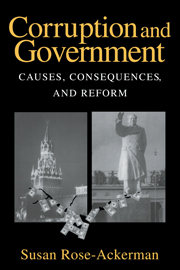Book contents
- Frontmatter
- Contents
- Preface
- 1 Introduction: The Costs of Corruption
- Part I Corruption as an Economic Problem
- 2 The Economic Impact of Corruption
- 3 Corruption of High-Level Officials
- 4 Reducing Incentives and Increasing Costs
- 5 Reform of the Civil Service
- Part II Corruption as a Cultural Problem
- Part III Corruption as a Political Problem
- Part IV Achieving Reform
- References
- Name Index
- Subject Index
2 - The Economic Impact of Corruption
Published online by Cambridge University Press: 05 June 2012
- Frontmatter
- Contents
- Preface
- 1 Introduction: The Costs of Corruption
- Part I Corruption as an Economic Problem
- 2 The Economic Impact of Corruption
- 3 Corruption of High-Level Officials
- 4 Reducing Incentives and Increasing Costs
- 5 Reform of the Civil Service
- Part II Corruption as a Cultural Problem
- Part III Corruption as a Political Problem
- Part IV Achieving Reform
- References
- Name Index
- Subject Index
Summary
All states, whether benevolent or repressive, control the distribution of valuable benefits and the imposition of onerous costs. The distribution of these benefits and costs is generally under the control of public officials who possess discretionary power. Private individuals and firms who want favorable treatment may be willing to pay to obtain it. Payments are corrupt if they are illegally made to public agents with the goal of obtaining a benefit or avoiding a cost. Corruption is a symptom that something has gone wrong in the management of the state. Institutions designed to govern the interrelationships between the citizen and the state are used instead for personal enrichment and the provision of benefits to the corrupt. The price mechanism, so often a source of economic efficiency and a contributor to growth, can, in the form of bribery, undermine the legitimacy and effectiveness of government.
This chapter isolates the most important situations where widespread corruption can determine who obtains the benefits and bears the costs of government action.
The government may be charged with allocating a scarce benefit to individuals and firms using legal criteria other than willingness to pay. Bribes clear the market.
Officials in the public sector may have little incentive to do their jobs well, given official pay scales and the level of internal monitoring. They may impose delays and other roadblocks. Bribes act as incentive bonuses.
Those engaged in legal pursuits seek to reduce the costs imposed on them by government in the form of taxes, customs duties, regulations. Bribes lower costs. […]
- Type
- Chapter
- Information
- Corruption and GovernmentCauses, Consequences, and Reform, pp. 9 - 26Publisher: Cambridge University PressPrint publication year: 1999
- 2
- Cited by



